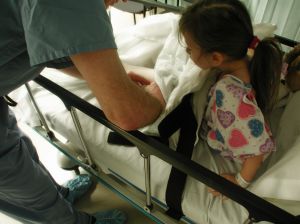
Gastroenteritis refers to inflammation of the stomach and intestines, and is characterised as viral gastroenteritis when the inflammatory condition is caused by infection with a virus. Viral gastroenteritis is often called the ‘stomach flu’ because it is caused by a virus, even though the influenza virus is not one of them.
The general symptoms associated with viral gastroenteritis are vomiting and diarrhoea, and the illness is prevalent across all parts of the world. The different viral strains that cause gastroenteritis are often prevalent at different times of the year, depending on the season. For example, some viruses occur during the cooler months of the year, while other viruses are active throughout the year, and responsible for infections all the time.
Viral gastroenteritis occurs most frequently in group settings where people associate closely with one another, share toilet facilities, and share the same food and beverages regularly. Outbreaks of viral gastroenteritis often occur in schools, child care facilities, nursing homes, banquet halls, cruise ships, dormitories and campgrounds.
Anyone is at risk of contracting viral gastroenteritis, as it occurs in people of all ages and backgrounds, but some specific types of viruses often cause infection in different subsets of people. For example, some viruses cause infection most commonly in infants and young children, while older children and adults are more likely to be infected by other viruses.
Symptoms
The main symptoms and signs associated with viral gastroenteritis are watery diarrhoea and vomiting. People may also experience headache, fever, and abdominal cramps. Usually, these symptoms begin 1 to 2 days after a person becomes infected with a virus that causes gastroenteritis. Depending on which virus is responsible for the infection, the symptoms can vary, and last for 1 to 10 days.
Causes
Gastroenteritis causes damage to the intestine, allowing water to flow from the blood into the intestine, which depletes the body of both fluid and electrolytes. The body then tries to get rid of the excess fluid by excreting it, which causes watery diarrhoea. The different viruses that cause gastroenteritis do this in different ways. This can be from:-
- Direct destruction of the cells lining the intestine (enterocytes), when the virus attaches to the intestinal wall.
- The presence of the virus having a toxic effect on the mucous membrane lining the intestine.
- The production of an enterotoxin, a toxin specific to the cells of the intestinal mucosa, which causes them to secrete water.
There are many different viruses that can cause gastroenteritis. These include:-
Rotaviruses
Rotaviruses are the most common cause of severe diarrhoea in children. After being infected by this type of virus, symptoms usually develop after two days (incubation period). Infection with rotavirus is characterised by vomiting and diarrhoea for 3 to 8 days, and frequent abdominal pain and fever. The primary route of transmission is faecal-oral (when faecal particles from one individual are introduced into the mouth of another), and because these viruses are very stable in the environment, rotavirus are often spread by ingestion of contaminated water, food, or by contacted with contaminated surfaces.
Norwalk viruses
Norwalk viruses commonly infect adults and older children. These viruses are also passed in the faeces, and people can contract Norwalk virus by swallowing food or water contaminated with the faeces of an infected individual. Norwalk viruses only affect humans and do not make other animals sick. Outbreaks often occur in association with the consumption of raw or uncooked shellfish, which have been contaminated by sewage or the faeces of an infected fish-handler. Other sources of infection also include ready-to-eat foods, ice, eggs and salads. The incubation period for Norwalk virus is 1 to 2 days. Symptoms include nausea, stomach cramps and diarrhoea, and usually last for 2 to 3 days.
Noroviruses
Norovirus cause nausea, vomiting, diarrhoea and mild stomach cramps. Some people also experience fever, chills, headache, muscle aches and generally fatigue. The incubation period for norovirus is very short, only 12 to 48 hours, and symptoms can present suddenly, with the infected individual rapidly beginning to feel very ill. Symptoms usually only last 1 to 2 days, but people can remain contagious for up to 2 weeks. Norovirus is found in the faeces and the vomit of infected individuals.
Caliciviruses
Caliciviruses are major causes of acute (rapid onset) gastroenteritis in all age groups. These viruses are related to noroviruses, and cause similar, but generally milder symptoms. Outbreaks of viral gastroenteritis associated with calciviruses are often detected in winter months and are spread by person-person contact and exposure to contaminated food and water.
Adenoviruses
Adenoviruses are spread via direct contact, faecal-oral transmission, and occasionally by contact with contaminated water. Only 2 types of adenovirus cause gastroenteritis, which are known as enteric adenoviruses. The type of illnesses associated with adenoviruses often depends on where they are taken into the body. For example, infection with some adenoviruses causes severe lower respiratory tract disease when inhaled, but do not cause any disease when swallowed. Adenoviruses are responsible for outbreaks of viral gastroenteritis all year round.
Astroviruses
Astroviruses are rarely spread by contact with contaminated food or water, and are usually contracted by contact with an infected individual. These viruses typically only cause infection in infants and children, but sometimes cause gastroenteritis in adults. The symptoms associated with astroviruses are mild diarrhoea, vomiting and stomach cramps. Outbreaks of gastroenteritis in association with astroviruses occur more often in the winter.
Transmission
Viral gastroenteritis is highly contagious, which means it is easily spread. The viruses that cause gastroenteritis can be spread from person to person by having close contact with infected individuals. This could include sharing food, water or eating utensils. People can also become infected by eating or drinking contaminated food or beverages.
Food can become contaminated with gastroenteritis viruses by people that handle or prepare the food. This is usually because they do not wash their hands regularly, or adequately after going to the toilet. People who eat raw or undercooked shellfish can contract gastroenteritis because often, shellfish are harvested from waters contaminated by sewage or effluent. Outbreaks of viral gastroenteritis have also been linked to the consumption of frozen foods such as raspberries. Drinking water contaminated with sewage can also harbour the viruses that cause gastroenteritis.
Complications
For most people, viral gastroenteritis is not a serious illness. People who contract gastroenteritis usually completely recover without any long term problems. For people who are unable to replace the fluids lost through vomiting or diarrhoea, gastroenteritis is a serious illness. Infants, young children, and people who are unable to care for themselves, such as the disabled or the elderly, are at risk of dehydration from fluid loss. People who are immunocompromised are at a greater risk of dehydration because they can contract more serious symptoms of vomiting and diarrhoea. People who are at more serious risk may require hospitalisation to treat their symptoms.
Diagnosis
Often the symptoms of viral gastroenteritis are similar to those associated with bacterial (such as Salmonella or Escherichia coli), or parasitic infection (such as Giardia), but a physician can generally diagnose viral gastroenteritis in conjunction with medical examination. If rotavirus is suspected as the cause of the gastroenteritis, then additional testing of the stool can be used to diagnose the infection. At the moment, however, there are no additional tests readily in use to detect the presence of the any of the other viruses that cause viral gastroenteritis.
Treatment
The primary concern for treating viral gastroenteritis is to prevent dehydration (severe loss of fluid). For infants, children and adults, the administration of an oral rehydration solution is recommended. This is a treatment for diarrhoea-related dehydration in which an electrolyte solution containing fluids and vital ions is administered orally. It consists of a solution of salts and other substances such as glucose, sucrose, citrates or molasses, which is administered orally. Oral rehydration solutions are readily available from pharmacies without a prescription. Simply drinking water can be an ineffective form of treatment because it does not contain the necessary electrolytes essential for maintaining body function. Prescription medications such as antibiotics are not effective treatments because they are unable to stop the viruses from growing and cannot destroy them.
Prevention
People can reduce the chance of becoming infected with a virus that causes gastroenteritis by:-
- Frequently washing their hands after using the bathroom or going to the toilet, and maintaining good personal hygiene.
- Thoroughly washing surfaces that may be contaminated using bleach-based household cleaners. This destroys the virus particles in the environment, and helps to stop them from spreading.
- Carefully wash foods before preparation, thoroughly cook shellfish, and steam oysters before eating them.
- Immediately remove and wash clothing or linens that may be contaminated with virus, after an episode of illness, with hot soapy water.
Currently, a vaccine is being developed to try to prevent viral gastroenteritis. The vaccine is targeted at reducing the prevalence of rotavirus infection in infants and young children.






Leave A Comment